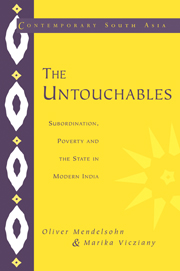Book contents
- Frontmatter
- Contents
- List of tables
- Glossary
- Preface
- 1 Who are the Untouchables?
- 2 The question of the ‘Harijan atrocity’
- 3 Religion, politics and the Untouchables from the nineteenth century to 1956
- 4 Public policy I: adverse discrimination and compensatory discrimination
- 5 Public policy II: the anti-poverty programs
- 6 The new Untouchable proletariat: a case study of the Faridabad stone quarries
- 7 Untouchable politics and Untouchable politicians since 1956
- 8 The question of reservation: the lives and careers of some Scheduled Caste MPs and MLAs
- 9 Subordination, poverty and the state in modern India
- Bibliography
- Index
9 - Subordination, poverty and the state in modern India
Published online by Cambridge University Press: 05 June 2012
- Frontmatter
- Contents
- List of tables
- Glossary
- Preface
- 1 Who are the Untouchables?
- 2 The question of the ‘Harijan atrocity’
- 3 Religion, politics and the Untouchables from the nineteenth century to 1956
- 4 Public policy I: adverse discrimination and compensatory discrimination
- 5 Public policy II: the anti-poverty programs
- 6 The new Untouchable proletariat: a case study of the Faridabad stone quarries
- 7 Untouchable politics and Untouchable politicians since 1956
- 8 The question of reservation: the lives and careers of some Scheduled Caste MPs and MLAs
- 9 Subordination, poverty and the state in modern India
- Bibliography
- Index
Summary
The heart of this work is an attempt to assess the condition and prospects of a large number of specially subordinated Indians. We did not begin our inquiries with the object of writing about a particular category of people, though this is what the book has become. Initially we were interested in certain dynamic problems, above all the matter of agrarian violence. These beginnings still colour the work. In order to develop explanations for the seemingly high level of violence suffered by one category of victims, the Untouchables, we began to uncover layers of what it means to be Untouchable in India today. It does not mean what it meant fifty, and certainly not one hundred and fifty, years ago. The need to unpack the condition of being an Untouchable has drawn us into a variety of processes, programs, structures and patterns of thought. We have tried, in short, to compose a work that provides a relatively comprehensive account of the lives of Untouchables today, and just how these lives have been historically constructed. In order to balance the inherent superficiality of generalisation we have also engaged in more intensive investigation of particular situations and communities.
While the objects of this work have been firmly rooted in practical problems of Indian life today, they have also been framed by an end-of century interrogation of the appropriateness of designating a large segment of the Indian population to be ‘Untouchables’ (or some synonym such as ‘Harijans’ or ‘Dalits’). This interrogation proceeds from a couple of apparently quite distinct sources.
- Type
- Chapter
- Information
- The UntouchablesSubordination, Poverty and the State in Modern India, pp. 258 - 271Publisher: Cambridge University PressPrint publication year: 1998



